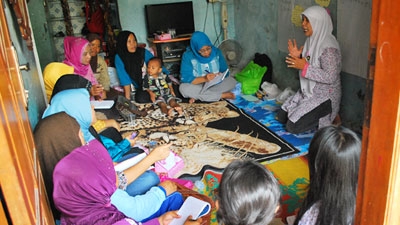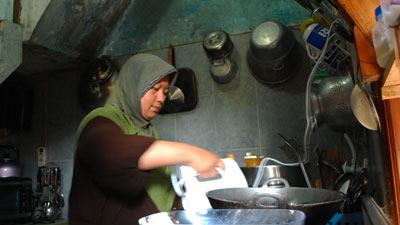Bank Group Contribution
The PNPM Peduli is a government-led, multi-donor trust funded program being delivered as a ‘pilot initative’ through the PNPM Support Facility (PSF), which is managed by the World Bank. An initial budget of US$4,215,000 was approved by the Joint Management Committee in January 2010, to develop the project design, operational procedures and award grants to an initial three EOs for the implementation of phase 1. A further US$5.5 million was allocated in April 2012, taking the total investment in the PNPM Peduli in the pilot phase to US$9,715,000.
Partners
Since its inception, Peduli has partnered with 72 Indonesian CSOs comprising the 3 EOs, 3 Intermediary Partners (IPs), 36 local CSOs and 30 branches of Lakpesdam NU. These partners are working in 91 districts across 24 provinces with a wide range of marginalized groups, including indigenous people, female micro-entrepreneurs, farmers and fishers, garbage collectors, street children, sex workers, ex-political prisoners, migrant workers, women and children at risk of trafficking, gay and transgender people, survivors of domestic violence, children in prison and people living with HIV.
The PNPM Support Facility is funded by the Australian Agency for International Development (AusAID), the Canadian International Development Agency (CIDA), the Danish International Development Agency (DANIDA), the U.S. Agency for International Development, the European Union, the Dutch Government, UKAID, and managed by the World Bank.
Moving Forward
Between August and October 2012, an external review team conducted an assessment of the program to prepare for full implementation in phase II. The assessment concluded that the PNPM Peduli is on track—the pilot has established a set of relationships and business systems that will support it to move forward in developing and understanding effective approaches to reaching and empowering marginalized groups in Indonesia in the future. Moving forward, based on learning and recommendations from this review, national CSOs will focus on taking evidence from the field to develop a body of knowledge on pathways to inclusion. The aim is that this can be translated into policy advice for the government to strengthen those line ministries trying to reach target populations currently excluded from public services and systems.
Beneficiaries
"Before when I passed every village, street people would whisper, 'look out jablay*'. I was not considered human. Through Bandung Wangi, I met friends, learned to speak in public, and now even have a pulsa counter. It is like a dream." Ani was a sex worker in Jatinegara East Jakarta. She tried to find alternative work, but people knew she was a sex worker and wouldn’t employ her. Under the PNPM Peduli, a local CSO (Bandung Wangi) provided her and 20 other female sex workers with skills and business training. Together with four friends, Ani has now left sex work and they jointly run a phone card counter. She doesn’t make as much money as before, but notes she is safe, no longer a victim of sexual abuse or violence, and has improved her health. Bandung Wangi provided the business group with equipment and rental space, and provides ongoing advice to the business. These women are now paying back the loan to Bandung Wangi for the equipment and supplies.
*” Jablay‟ is derogatory slang word that refers to ones need for sexual interaction



